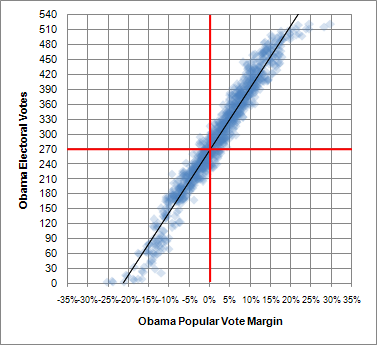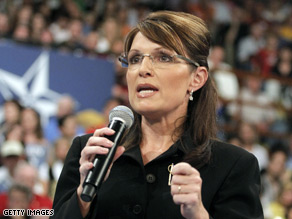Network news executives said they are preparing for an unusual Election Night challenge: How to be honest with the audience, and still keep them tuned in, if the race between Sen. John McCain and Sen. Barack Obama is effectively decided before most Americans have finished dinner.
After two elections in which the suspense went far into the evening (and, in the case of 2000, for 36 days afterward), the executives said they are contemplating how to manage their newscasts in the event of an Obama blowout — in which the Democrat’s victory would be obvious while polls are still open in most of the country.
“Our policy is that we won’t call individual states until all of the voting in those states is finished,” said Jeffrey Schneider, ABC News senior vice president. “If enough of those states add up to 270 electoral votes, then the outcome is obvious.”
The quandary is highlighted by Virginia, a state that has not voted Democratic for president since 1964 but where Obama is now leading in polls. There is no realistic McCain electoral college strategy that does not depend on winning the Old Dominion.
If it is clear on Nov. 4 that Obama has won in Virginia by the time polls there close at 7 p.m. — it will still be daylight west of the Mississippi — the obvious conclusion will be that Obama is headed to the White House.
But executives are already mulling how clearly they would want their anchors and analysts to state the obvious, since networks have been criticized for depressing turnout by calling elections while polls are still open for several more hours. But they must also decide how they are going to fill air time, since networks are planning to be on the air until 2 a.m. on the East Coast.
Paul Friedman, CBS News senior vice president, said he has started to think “about what we could do to augment our Senate and House coverage on election night if the presidential story is over."
“As to the presidential race, it's pretty simple: We will try to call a winner in each state as soon as possible after the polls close in each state,” Friedman e-mailed. “If that adds up to 270 for someone before the polls close in the West, there's not a lot we can do. If there are not enough electoral votes for one man to win it before the Western states close, but we're pretty sure how they're going to fall, we will be ready with language which states the obvious without being too obvious. We can't be in the business of pretending to be stupid.”
Network political experts do not expect a candidate to reach the winning threshold of 270 electoral votesbefore 11 p.m. Eastern. “Nearly a mathematical impossibility,” one network official e-mailed.
So even if the trend looks insurmountable, the technical suspense will remain, even in the outcome has been clear for hours.
Friedman said that in case of a landslide, “We could say something like, ‘Given the number of electoral votes Obama already has, and given what we know about the voting so far in various states where the polls have not closed, it is going to be very hard for John McCain to win.’ I would sincerely hope that kind of language would not discourage people out West from voting.”
Sam Feist, CNN's political director, cautioned that it could be harder than ever to project states early because all of the new, young and African-American voters could scramble turnout models. "Projecting races on Election Night is very dependent on comparisons to what the vote looked like in previous years," he said.
A night of early surprises would be a gift for John King's "Magic Wall" of computerized maps. Feist said: "If we know early in the evening that Barack Obama wins a critical state such as Virginia or Florida, we'll have a conversation about what John McCain would have to pull out of his hat now," such as Wisconsin, Minnesota, New Mexico, Colorado or Nevada.
McCain strategists, while not conceding defeat, argue that they are running in what is perhaps the most hostile climate a major-party nominee has ever faced, considering the economic implosion, the unpopularity ofPresident Bush and news coverage that they believe has turned against them.
McCain is playing defense in a host of states that George W. Bush won twice, most notably Ohio and Florida but also such normally safe states as North Carolina and Indiana (which, incidentally, has a 6 p.m. Eastern poll closing).
Bush strategist Karl Rove contended in The Wall Street Journal on Thursday that “Obama Hasn't Closed the Sale,” but even Rove called a McCain recovery “improbable.”
“This task, while not impossible, will be difficult,” Rove wrote. “If Mr. McCain succeeds, he will have engineered the most impressive and improbable political comeback since Harry Truman in 1948. But having to reach back more than a half-century for inspiration is not the place campaign managers want to be now.”
After McCain failed to shake up the race in Wednesday’s debate, pundits have been increasingly bold in suggesting that the race could be over.
As the leading edge of what is likely to be a race by journalists to forecast the outcome of what has been the most exciting presidential race in American history, ABC News veteran Sam Donaldson said of McCain on “Good Morning America” on Thursday: “Something could happen. But unless it does, he’s going to lose.”
Over on MSNBC, host Joe Scarborough said on “Morning Joe”: “When it becomes obvious that one candidate’s going to lose, usually members of that party start jumping, like rats from a ship. You’re starting to hear from Republicans that are really afraid McCain’s going to lose, Democrats may [reach] 60 in the Senate, and this is going to be a historic rout.”
And Republican analyst Torie Clarke, who once worked as McCain’s Senate press secretary and who appeared with Donaldson, had this advice for her former boss: “He has to ask himself some very tough questions, because one way or the other, this is the final chapter in his political career. And how does he want to write that final chapter? … Does he want to do anything in an effort to win, or does he want to go out the way he likes to think of himself — as a public servant?”
(SOURCE: http://news.yahoo.com/s/politico)






 Read The Complete CBS News/NY Times Poll On The Presidential Race
Read The Complete CBS News/NY Times Poll On The Presidential Race
